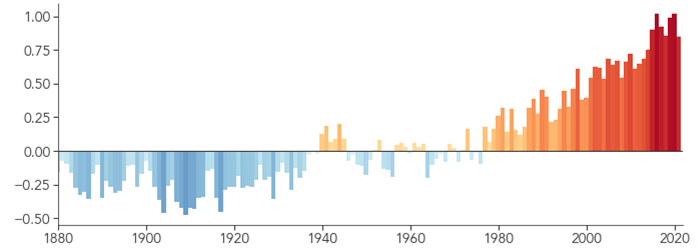What can we do to combat rising temperatures?
Why are temperatures rising and what can we do to prevent it?
The UK has declared a national emergency after its first red extreme heat warning. Temperatures Monday and Tuesday are expected to hit 40°C in some parts of the country. But why are we experiencing record temperatures and what can be done to mitigate it?
Climate change and global warming
At a global level, we are increasingly witnessing weather extremes such as heatwaves, flooding and droughts. Although an individual weather event can’t be attributed to climate change, long-term climate shifts such as global warming can. Since the 1800s, human activities have been the main driver of climate change, primarily due to burning fossil fuels like coal, oil and gas. Burning fossil fuels generates greenhouse gas emissions that act like a blanket wrapped around the Earth, trapping the sun’s heat and raising temperatures. The graph below from the NASA Earth Observatory demonstrates the rise in global temperature since 1880.
Global Temperature Anomaly (°C compared to the 1951-1980 average)

The increase in global temperatures, as shown above, is referred to as global warming. Global warming is the long-term heating of Earth’s climate system observed since the pre-industrial period due to human activities. Since the pre-industrial period, human activities are estimated to have increased Earth’s global average temperature by at least 1°C.
According to the IPCC, we must limit global warming to 1.5°C in order to avoid catastrophic climate disasters. The IPCC’s Business-as-Usual scenario predicts that global temperatures could rise by 3°C by the end of the century, which would have catastrophic consequences to all life on Earth.
What can be done?
Global CO2 emissions need to fall by around 45% from 2010 levels by 2030 and reach net zero emissions by 2050 in order to remain on a 1.5°C pathway. The UK Government has committed to reducing emissions by 78% by 2035 and achieving net zero emissions by 2050. But in order to meet these goals, a collaborative effort is needed across all sectors.
Steep greenhouse gas emissions reductions are needed immediately to tackle global warming and other catastrophic changes to the climate. This means businesses and governments must measure their carbon footprints, create and implement decarbonisation strategies and offset any unavoidable residual emissions with permanent carbon removals.
It’s also important that the largest UK-registered companies and financial institutions assess and disclose their climate-related risks and opportunities in line with the recommendations of the Task Force on Climate-Related Financial Disclosures (TCFD). The UK Government intends to make this reporting mandatory across the entire economy by 2025.
Understanding and reporting on the physical and transition risks that climate change poses can allow businesses to prepare for the risks and make the most of the opportunities to adapt, such as procuring renewable energy, optimising their energy efficiency and remaining competitive as the market favours more sustainable products and services. Providing the financial markets with high-quality, transparent information will allow us to transition smoothly to a low-carbon economy.
How can we help?
Here at Optimised, we can support you with a wide range of energy-related services, such as energy procurement, BeMS, carbon accounting, net zero and TCFD reporting. We can help implement decarbonisation strategies and ensure that companies are playing their part in the collaborative effort to reach net zero, while also preparing for the risks that climate change presents.
For more information about how we can support your journey to net zero, get in touch with our Optimised Net Zero team.
BOOK YOUR 30-MINUTE ENERGY MANAGEMENT CONSULTATION
Fill in your details below to arrange a complimentary consultation with one of our experts. They will give you bespoke advice to help your business achieve all its energy needs, reducing cost, consumption and carbon.










